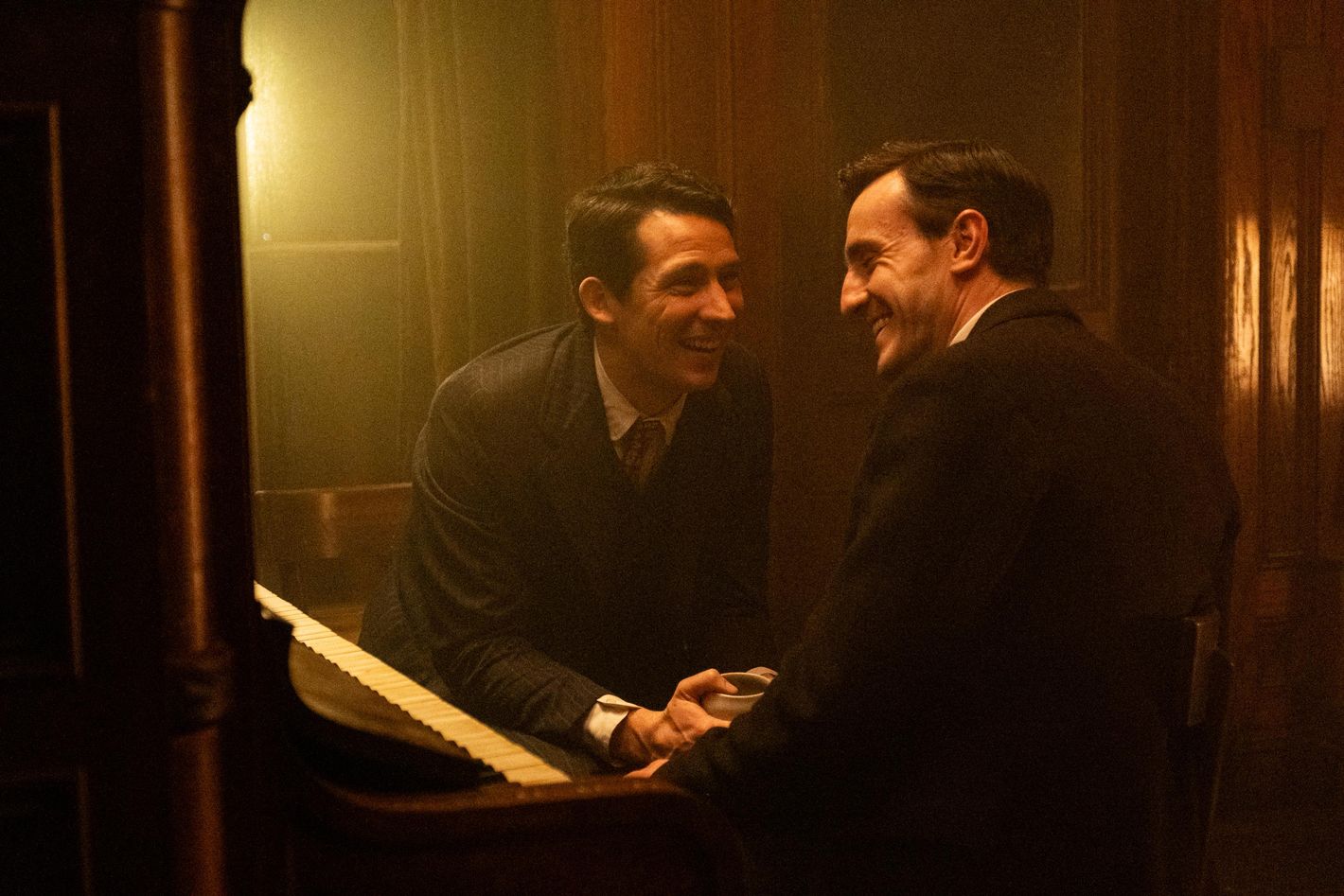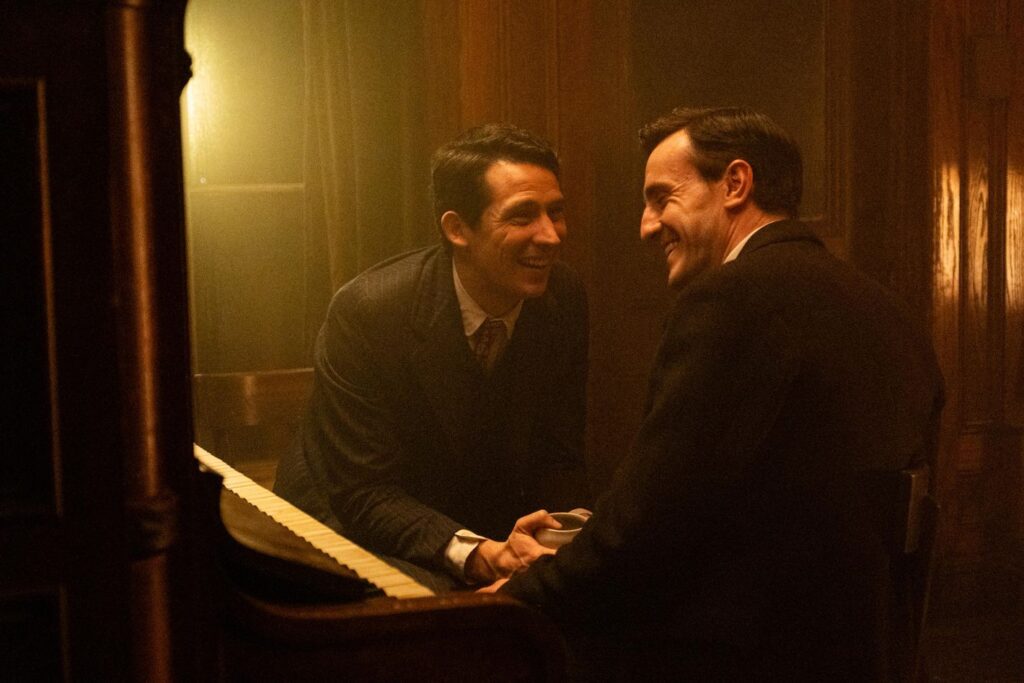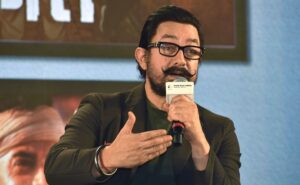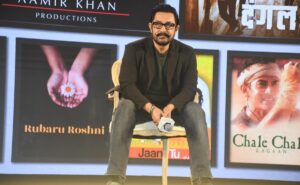
Paul Mescal, Josh O’Connor, and director Oliver Hermanus have been trying to make The History of Sound since 2020, just after Mescal rose rapidly to fame with Normal People and O’Connor did the same with The Crown. All of the usual suspects (financing, strikes, the pair’s increasingly frenetic schedules) got in the way for nearly five years, but the film finally premieres tonight at Cannes. It’s a quietly devastating WWI romance between Mescal’s Lionel and O’Connor’s David, students at the Boston Conservatory who flirt at a piano bar, fall into bed together, bond over a shared love of American folk music, and soon thereafter embark on a trip through the backwoods of Maine to record and collect the region’s songs.
The very existence of the film, which is based on a short story by Ben Shattuck, has already worked various corners of the internet into a lather, and they’ll be glad to hear that Mescal and O’Connor have intense and believable chemistry, exchanging lots of yearning glances, hooking up in hallways and tents, and falling asleep on each other’s chests. Much goes painfully unspoken between Lionel and David; instead, Mescal and O’Connor impressively convey their soulful connection with long, live singing scenes, harmonizing beautifully as they stare at each other from across a room or over a piano. As an appropriately mournful rain poured down the day before The History of Sound’s premiere, I talked with Mescal and Hermanus (O’Connor, filming a new Steven Spielberg film, couldn’t make it to the fest).
Oliver, you’ve said you couldn’t have made the film in the same way you did back in 2020 before Josh and Paul became as famous as they are now. What did you mean by that — and how did you cast them? How did you know?
Paul Mescal: Yeah, what did you mean by that?
Oliver Hermanus: How did I know? I think about the actors I want to work with. I don’t think, like, Are they going to pay the bill for the movie? In this industry, they say you have to have “two brains,” and I try very hard not to have that second brain. I want to always just work with people I admire. Thank goodness, Paul became Paul. But it was never going to be a case of giving up on the film or shrinking it because we couldn’t get what we wanted. We were just going to wait it out.
What was your experience of the wait, Paul?
Mescal: My experience was one of very little patience. I remember reading this for the first time on Christmas 2020, and I was so new to the industry that I was like, “I love this script and it’s going to happen in four months and I’m ready.” Slowly, that time became five years. And I remember there were two or three junctions where the film was possibly going to happen and then being told “no.” I was receiving the same education Oliver talked about, where they needed me and Josh to get bigger so we could get the funding we require. But one thing I really admire about Oliver is that he’s able to facilitate the actor who’s not patient. And realize that, maybe we could have gone and made the film for x million dollars, but the film would have suffered. Ultimately, we waited until the right time. And I don’t think I would have understood the character as well as I did without the life I lived between first reading the script and five years later. So patience is a virtue. And I’m working on it.
What did you come to understand about Lionel that you didn’t at first?
Mescal: There’s a lot of life lived in five years. Especially in the madness of this industry and growing up within it from Normal People in 2020. It’s just that I feel older. I feel like this script is particularly complex. It’s not show-and-tell. You’re trying to figure out the tricky corners of somebody’s psychology, and you can only learn about that through your own life as a reference point.
You initially didn’t want the lead, right? Why not?
Mescal: I initially wanted to play Lionel. I can’t remember if you were asking me to read it with Lionel in mind. It was a cold read. And I loved both of the characters. They reminded me of characters I used to get to play in drama school, which I haven’t really had the opportunity to play since. I suppose if I’m being honest now, a little bit of it was to do with fear. I looked at Lionel and I was scared of the undertaking. There’s something very challenging about Lionel. He doesn’t extend himself towards the audience; he’s inviting the audience to come towards him. That’s a scary prospect as an actor. David, on the surface, goes much more towards the audience. So I read it and said, “I’ll play David,” and Oliver said “yes” and then four months later, he was like, “Hey.” At this point, I thought he was going to say “We’re going next month,” but it was “Forget about it until next year” and “Will you play Lionel?” I said I’d have to think about it. I read it for a couple of weeks and then I got my head around the fact that the root of my reason was fear. And I’m so glad you pushed me towards that.
Why’d you swap them?
Hermanus: I just woke up in the middle of the night going, I think he’s actually Lionel. I got to know Josh and Paul better, and I was like, How do I approach both of them and negotiate this? It’s a question of, Do the actors care about the film as much as I do, that they want to get it right no matter what? As it happened, he was shooting at the time —
Mescal: I was shooting God’s Creatures, yeah. I just had to go away and read it. I had been preparing to be David, so I had to go back and read it again and just sit with it for a bit.
How do you push past that fear? And have you gotten better at it over the years?
Mescal: I think I’ve gotten better at it. But I think especially with the independent films I’ve done, this is the most traditional lead I’ve played. Gladiator is a different entity entirely. Even something like Aftersun is more of a co-lead situation. I hadn’t done that yet; I think this is the first version of that for me in films of this scale and feel. And I push past it by just pulling my trousers up and going, You’re ready for this. And putting a lot of trust in Oliver. It was an experience of playing a role in cinema where it’s not about showing the audience what you’re feeling the whole time. This is an extreme example of that. I would constantly go to Oliver, “Are they going to understand what I’m doing?” And he would keep pointing me in the right direction.
Can you tell me about the singing? Did that scare you too? You’re so exposed when you sing.
Mescal: That was always the conversation. It’s really not a musical in terms of performance or style. Those kinds of American folk songs are actually kind of rooted in Irish culture, and it’s an Irish style of singing I’d grown up around and the kind of singing and music that I love. So that wasn’t really something that caused me nerves per se. I was looking forward to it. But when they do call “quiet” on the set and you’re standing up to sing “Silver Dagger” —
Hermanus: Day two.
Messcal: Oh yeah, on day two!
You were singing live?
Mescal: Oh yeah, the whole time. The film would really suffer without that.
So much of the chemistry between you and Josh is unspoken; instead it’s physical or in songs and glances. Can you tell me about developing that together, creating that relationship?
Mescal: When I saw the film for the first time, there’s a real tenderness and an intellectual understanding of each other. That’s the driving force of their relationship. On the surface, I think if people are coming in expecting it to be a big, sweeping romance, it’s way more complicated than that, more interesting than that. It’s definitely that, but it’s also a meeting of the minds. You know the feeling when you meet somebody and you have a shared interest with them and it’s a deep shared interest?
Yes.
Mescal: It’s love, it’s admiration, it’s intellectual stimulation, it’s physical attraction. All of those things are intertwined and sometimes get torn. David is holding secrets back. And Lionel, there’s something fascinating about the fact that he’s happy to be a blank canvas. He’s so open and honest. You see that disconnect in these thorny conversations.
A lot of it, as you said, is in glances. The building of chemistry is just that me and Josh just have the most fun. I know the film has kind of an intense feel to it, but Josh has the capacity to make me feel very much like a young boy. I felt very playful. You wouldn’t necessarily associate it with the tone of the film.
Hermanus: It was a really strong bond. And they were naughty.
Mescal: Say more!
How so?
Mescal: Yeah, how so?!
Hermanus: They were running around! Where are they?
Mescal: There’s a big crane shot — I don’t know if it’s in the film anymore. We’re getting off this boat.
Hermanus: It is!
Mescal: Oh, it is. And it’s like this big long scene, and Josh is talking to this schoolteacher, and he turns to me, and the camera is fucking miles away, and he just starts immediately laughing. And we walk up the hill like this [shoulders shaking with laughter]. And Oliver goes, “Do you want to do it properly this time, like you’re getting paid to do your jobs?” Like, we’re thinking we’re not going to get seen by the cameras.
Hermanus: And he forgot all his lines.
Mescal: Oh yeah, all his lines. Turned to me. And he didn’t even go like, “I’ll just stop, then.” He did all the blocking. I was like, “What the fuck do you want with this?” I do think it’s important. It depends on the relationship you have with the actor you’re working with; sometimes you benefit from a real intensity, and Josh and I never decided, “Oh, we’re going to make this light.” Because I think when it was required, we’d drop into a much deeper place.
Hermanus: That’s a testament to the talent.
That they can drop in and out?
Hermanus: Yeah, and it never affected the calibration of that, the intensity of that. My experience from the third perspective was that it was this inexplicable closeness that had so many different faces to it. Even, like, driving to work together. Which was stressful for me.
You and Josh?
Mescal: Yeah, we’d drive to work together. We’d drive ourselves.
Hermanus: A director’s worst nightmare.
Why?
Mescal: Well, because if we die there’s no film. That old chestnut.
Hermanus: You want to, like, pad their lives. I’m like, “Let’s not drive!”
Mescal: “What time should I pick you up?” I remember feeling — we shot for six or seven weeks, and Josh was there for the first three weeks. And it was a really interesting thing for Lionel and me, because when he left, I really felt like I missed him. With independent film, you can get hemmed in by financial restraints and sometimes the scheduling suffers. But our first AD did an amazing job scheduling Josh like that. Because he was gone, and I missed him.
Hermanus: I was like, “Is Paul going to be okay?”
Mescal: And I was meeting all of the characters Lionel was meeting, like, “You’re lovely, but you’re not Josh. I miss my friend.”
Were you guys friends beforehand?
Mescal: We bumped into each other in 2020. I was like, “I can’t wait to make this film next month.” And Josh was like, “I’m pretty sure it’s actually …” But Josh did a Zoom with me after Normal People because we shared an agent. He was one of the first people who reached out, just because he wanted to say “hi.” He’s a sweetie. One of the good guys. We knew each other before, but this was really the moment we got to know and love each other.
Do you hang out now?
Mescal: Yeah, we do. He’s unfortunately not going to be able to make it tomorrow because his scheduling ran over on the Spielberg. We talked to him yesterday, and he’s obviously devastated. It’s a tough one because it’s been years of our lives.
Spielberg can’t release him?!
Mescal: Naughty corner for Spielberg! But look, we were kind of trying to talk Josh off the ledge and be like, “It’s only May and we don’t know when the film is coming out, but we’ll get to promote this together.”
More From the 2025 Cannes Film Festival
Paul Mescal on his quietly devastating WWI romance, in which he has intense and believable chemistry with Josh O’Connor.

































































